'There is more to archaeology than Indiana Jones'
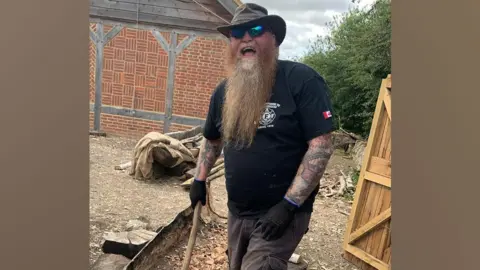 Operation Phoenix
Operation PhoenixA firefighter invalided out of the service said a project using archaeology to support his mental health "helps control how I feel".
Gary Noble, 57, from Wellingborough, Northamptonshire, is taking part in Operation Phoenix, a scheme pioneered by Northamptonshire Fire and Rescue Service to support the wellbeing of current and retired staff.
Founder Aidan Phillips, 61, said he was inspired by the Ministry of Defence's Operation Nightingale, which uses archaeology to aid the recovery of injured service personnel.
"We tend to internalise our pain [but] the whole environment of archaeology is gentle and non-confrontational and fascinating and draws you in," said the watch manager.
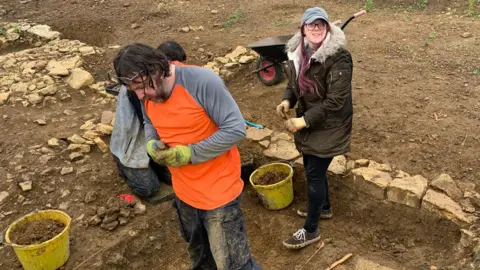 Operation Phoenix
Operation PhoenixMr Noble was "not the slightest bit interested" in the subject when he first met Mr Phillips at a Fire Fighters Charity rehabilitation centre.
"I didn't know anything about it other than Indiana Jones and there is so much more to it than I expected," he said.
In the six months since he joined, he has participated in a dig, as well as taking part in experimental archaeology projects, such as building an Iron Age-style round house and carving out a Bronze Age-style log boat.
Participants have also learned about osteoarchaeology, examining 50 Roman skeletons, and met archaeologists who discovered "Britain's Pompeii" Must Farm.
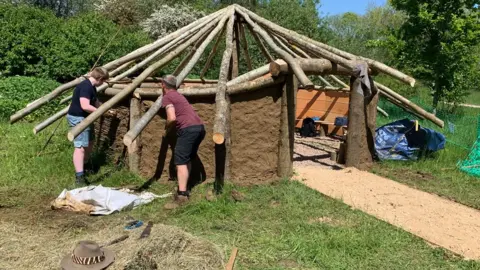 Operation Phoenix
Operation PhoenixMr Noble joined Cambridgeshire Fire and Rescue aged 33, after serving in the Royal Engineers.
His Cambridge-based career "came to an abrupt end" in 2014, he said, when he was medically discharged, after needing replacement knee joints because of work-based injuries.
He then experienced post-traumatic stress disorder (PTSD) after an attack left him with life-changing injuries.
"PTSD can have a detrimental effect on life and on the wife, kids, extended family, with all sorts of issues, including anger, but my trauma therapy was fantastic," said Mr Noble.
He was anxious when he started Operation Phoenix thinking, "all those boffins, I'm going to be out of my depth", but it has "helped control how I feel".
"There is no pressure and by getting hands-on, you're not thinking about anything other than what you're doing," he said.
"And you're getting connected and seeing yourself as part of the bigger picture and how we evolved from Stone Age to Bronze Age to Industrial Age, rather than in your own little world and the traumas in that little world."
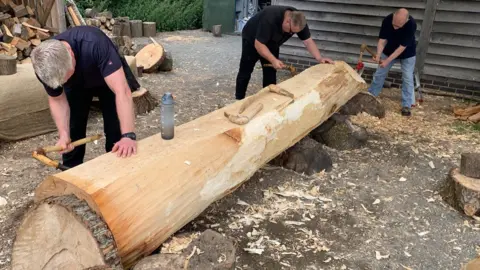 Operation Phoenix
Operation PhoenixThe pilot project is primarily aimed at serving and retired fire service staff, although it eventually hopes to include colleagues from the other "blue lights" emergency services.
Mr Phillips, a watch manager with 37 years experience, came up with the idea while watching BBC Two's annual archaeology series Digging for Britain.
"I'm on the fire service's wellbeing team and I kept seeing Operation Nightingale and thought I could make that work for us," said the keen amateur archaeologist.
"One of of the big things about the fire service, whether you're male or female, is there's still a macho image to it, we tend to internalise our pain.
"You don't go home to your partner talk about the traffic accident in which a child died."
With the fire service's blessing, he approached the Ministry Of Defence's archaeologist Richard Osgood and got the project started.
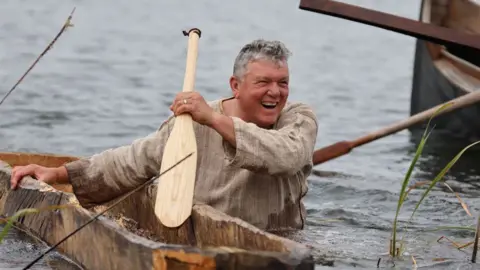 Operation Phoenix
Operation PhoenixThe pilot began in 2022 and is supervised by Leicester University's archaeology department, supported by Breaking Ground Heritage Charity, Northamptonshire Archaeological Resource Centre at Chester House Estate and Stanwick Lakes Heritage Project.
Participants engage in a year-long project to promote wellbeing by exploring the history of the Nene Valley and its inhabitants through the last 10,000 years.
"I think it works it because it puts like-minded individuals into a non-challenging, new environment and those people can enjoy that new experience together without feeling the need to explain themselves and why they need it," said Mr Phillips.
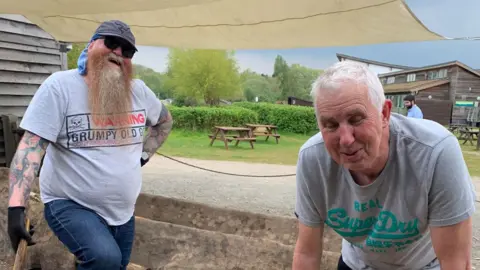 Operation Phoenix
Operation PhoenixRob Porter, the assistant chief fire officer for the Northamptonshire service, who has supported the project from its inception, said: “It’s important that our firefighters and fire staff have appropriate resources and networks to support their wellbeing.
"Operation Phoenix has had a really positive impact in helping those who have taken part, particularly in building their confidence and giving them a sense of purpose.
“Aidan has done a fantastic job in keeping the scheme running since it was launched a couple of years ago and we are very happy, along with our partners, to continue supporting the excellent outcomes it is achieving.”
Follow Northamptonshire news on BBC Sounds, Facebook, Instagram and X.
